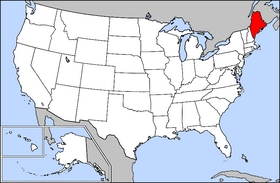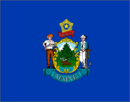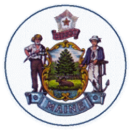Maine
|
|
| |||||
| State nickname: The Pine Tree State | |||||

| |||||
| Other U.S. States | |||||
| Capital | Augusta | ||||
| Largest city | Portland | ||||
| Governor | John Baldacci | ||||
| Official languages | None | ||||
| Area | 86,542 km² (39th) | ||||
| - Land | 80,005 km² | ||||
| - Water | 11,724 km² (13.5%) | ||||
| Population (2000) | |||||
| - Population | 1,274,923 (40th) | ||||
| - Density | 15.95 /km² (38th) | ||||
| Admission into Union | |||||
| - Date | March 15, 1820 | ||||
| - Order | 23rd | ||||
| Time zone | Eastern: UTC-5/-4 | ||||
| Latitude | 43?4'N to 47?28'N | ||||
| Longitude | 66?57'W to 71?7'W | ||||
| Width | 305 km | ||||
| Length | 515 km | ||||
| Elevation | |||||
| - Highest | 1,608 m | ||||
| - Mean | 180 m | ||||
| - Lowest | 0 m | ||||
| Abbreviations | |||||
| - USPS | ME | ||||
| - ISO 3166-2 | US-ME | ||||
| Web site | www.maine.gov | ||||
Maine is a state of the United States. It is probably named after the French province of Maine. Another possibility for the name 'Maine' is that the people living on islands along the coast of Maine used to speak of going to the mainland as 'going over to the Main". Its U.S. postal abbreviation is ME. Four U.S. Navy ships were named USS Maine in honor of the state. The state is chilly, with moderately warm summers but very few actual hot days.
| Contents |
History
Originally settled in 1607 by the Plymouth Company, the coastal areas of western Maine first became the Province of Maine in 1622 land patent. Eastern Maine north of the Kennebec River was more sparsely settled and was known in the 17th century as the Territory of Sagadahock. The province within its current boundaries became part of the Massachusetts Bay Colony in 1652, and was part of the Commonwealth of Massachusetts when the United States was formed. Because it was physically separated from the rest of Massachusetts and was growing in population at a rapid rate, it became the 23rd state along with Missouri on March 15, 1820. This has become known as the Missouri Compromise because admitting both states into the union kept the balance between slave and free states. Maine's original capital was Portland until 1832, when it was moved to the more geographically central city of Augusta.
Law and government
The capital of Maine is Augusta and its governor is John Baldacci (Democrat). Its two U.S. senators are Susan Collins (Republican) and Olympia Snowe (Republican).
Maine's politics are notable for several reasons, and are dramatic. In the 1930s, it was one of very few states which remained dominated by the Republican Party. In the 1936 presidential election, Franklin D. Roosevelt received the Electoral Votes of every state other than Maine and Vermont.
Beginning in the 1960s, Maine began to lean toward the Democrats. In 1968, Hubert Humphrey became the first Democrat in half a century to carry Maine (sans for the 1964 landslide victory of Lyndon Johnson), thanks to the presence of his running mate, Maine Senator Edmund Muskie. Maine has since become a left-leaning swing state, but has voted Democratic in four straight elections, casting its votes for Bill Clinton twice, Al Gore in 2000, and John Kerry in 2004.
Maine voters tend to accept independent and third-party candidates more frequently than most states. Maine has had two independent Governors recently (James B. Longley from 1975 to 1979 and Angus King from 1995 to 2003). The Reform Party of Ross Perot achieved a great deal of success in Maine in the 1992 and 1996 Presidential elections: in 1992 Perot came in second in Maine to Bill Clinton, despite the longtime presence of the Bush family summer home in Kennebunkport, and in 1996, Maine was again Perot's best state.
The Green Party candidate won nine percent of the vote in the 2002 gubernatorial election, more than in any election for a statewide office for that party. The Green Party also elected John Eder to the office of State Representative in Maine, its highest elected official nationwide. Maine politicians, Republicans and Democrats alike, are noted for having more moderate views than many in their party.
Since 1969, two of Maine's four electoral votes are awarded based on the winner of the statewide election. The other two go to the highest vote-winner in each of the state's two congressional districts.
Famous politicians from Maine include James Blaine, Edmund Muskie, Margaret Chase Smith, William Cohen, George J. Mitchell, Olympia Snowe, and Hannibal Hamlin.
See also: List of Governors of Maine, U.S. Senators from Maine, List of Maine State Senators, As Maine goes, so goes Vermont.
Geography
National-atlas-maine.png
See:
To the south and east is the Atlantic Ocean, and to the northeast is New Brunswick, a province of Canada. The Canadian province of Quebec is to the northwest. Maine is the northernmost state in the New England region and the easternmost state in the country (the easternmost city in the United States is Eastport, Maine), bordered on the west by New Hampshire. It is the only state that borders exactly one other state. Its largest lake is Moosehead Lake, and its highest mountain is Mt. Katahdin, which is the northern terminus of the Appalachian Trail.
Maine also has several unique geographical features. Machias Seal Island, off its easternmost point, is claimed by both the USA and Canada and is the only portion of all US boundaries still in dispute with respect to sovereignty. Also in this easternmost area is the Old Sow, the largest tidal whirlpool in the world.
Maine is the most sparsely populated state east of the Mississippi River, owing in part to its huge relative size—its land mass exceeds that of all other New England states combined. It is appropriately called the Pine Tree State, as 90 percent of its land is forest. In the forested areas of the interior there is much uninhabited land, some of which does not even have formal political organization into local units. For example, the Northwest Aroostook, Maine "territory" in the far north is listed as having an area of 2,668 square miles and a population of 27, or one person for every 100 square miles.
Maine is equally well known for its dramatic ocean scenery. West Quoddy Head is the country's easternmost piece of land. Along the famous rock-bound coast of Maine are lighthouses, sandy beaches, quiet fishing villages and thousands of offshore islands, including the Isles of Shoals, which straddles the New Hampshire border. Jagged rocks and cliffs and thousands of bays and inlets add to the rugged beauty of Maine's coast. Just inland, by contrast, is the view of sparkling lakes, rushing rivers, green forests and towering mountains. This visual contrast of forested slopes sweeping down to the sea has been aptly summed up by American poetess Edna St. Vincent Millay of Rockland and Camden, Maine in "Renascence":
- "All I could see from where I stood
- was three long mountains and a wood
- I turned and looked the other way
- and saw three islands and a bay"
More prosaic geologists describe this type of landscape as a drowned coast, where a rising sea level has invaded former land features, creating bays out of valleys and islands out of mountain tops. In the case of Maine there has been a partially offsetting rise in land also, due to the melting of heavy glacier ice, which caused a rebounding effect of underlying rock; however, this land rise was not strong enough to eliminate all the effect of the rising sea level and its invasion of some former land features.
Millions of ordinary Americans have enjoyed this coastal scenery at Maine's Acadia National Park, the only national park in New England, and the second-most visited national park in the United States.
The noted American ecologist Rachel Carson did much of her research at one of the Maine seacoast's most characteristic features, a tide pool for her classic "The Edge of the Sea." The spot where she conducted observations is now preserved as the Rachel Carson Salt Pond Reserve at Pemaquid Point.
Economy
The Bureau of Economic Analysis (http://www.bea.gov/) estimates that Maine's total gross state product for 2003 was $41 billion. Its per capita personal income for 2003 was $29,164, 29th in the nation.
Maine's agricultural outputs are seafood (notably lobsters), poultry and eggs, dairy products, cattle, blueberries, apples, and maple sugar. Aroostook County is known for its potato crops. Its industrial outputs are paper, lumber, and wood products, electronic equipment, leather products, food processing, textiles, and tourism. Naval shipbuilding and construction remain key as well, with Bath Iron Works in Bath and Portsmouth Naval Yard in Kittery.
Maine ports play a key role in national transportation. Around 1880, Portland's rail link and ice-free port made it eastern Canada's principal winter port, until the aggressive development of Halifax, Nova Scotia, in the mid-1900s. In 2001, Maine's largest city surpassed Boston as New England's busiest port (by tonnage), due to its ability to handle large tankers.
Maine has a small trapping industry, which, with 3,157 resident trappers, is nevertheless larger than that of most Eastern states ( Source: Portland Press Herald, Jan 23, 2005. Note: Many trappers are part-time). The principal pelt taken by value is beaver. Historically, however, beaver trapping was much more significant in the North Woods and Canadian Maritimes than the small industry of today and was the cause of much early wealth and many trading settlements.
Maine has very few large companies that maintain headquarters in the state, and fewer than before due to consolidations and mergers, particularly in the pulp and paper industry. Structurally, this could be a weakness in an economy that depends on extracting forest and sea resources, because decisions that affect the long-range stability of the resource base are being made in distant locations which do not have to live on a day to day basis with the consequences of their policies. Some of the very few large companies that do maintain headquarters in Maine include Fairchild Semiconductor (South Portland) and the famous outdoor supply retailer L.L. Bean (Freeport). Maine is also the home of The Jackson Laboratory, a non-profit institution and the world's largest mammalian genetic research facility.
Demographics
As of 2003, the state's population was 1,305,728.
Maine is a popular tourist destination, but it also experiences harsh winters and, consequently, the great temporary influx of visitors occurs during the warmer months. Many of these visitors establish an alternate secondary residence in Maine during some or all warm months and then depart for their primary residence in the off-season. These are the summer people of Maine lore. Official census figures normally count a person as a resident only once, at the place of the primary home. Therefore, there are some situations in which official census figures could be misleading for Maine. For example, some communities may have a much larger seasonal retail sector than their official, small population figure would imply.
As explained in detail under "Geography" there are large tracts of uninhabited land in some remote parts of the interior.
The racial makeup of the state is:
- 96.5% White non-Hispanic
- 0.7% Hispanic
- 0.7% Asian
- 0.5% Black
- 0.6% American Indian
- 1% Mixed race
The five largest ancestries in the state are: English (21.5%), Irish (15.1%), French (14.2%), American (9.4%), French Canadian (8.6%).
Religion
The religious affiliations of the people of Maine are:
- Protestant – 52%
- Roman Catholic – 31%
- Other Christian – 1%
- Other Religions – 1%
- Non-Religious – 11%
The three largest Protestant denominations in Maine are: Baptist (12% of the total state population), Methodist (8%), Congregationalist (3%).
Important cities and towns
|
Population > 10,000 (urbanized area) |
Suburbs and smaller towns |
Education
Colleges and universities
Professional sports teams
- Portland Sea Dogs, minor league baseball, Eastern League (U.S. baseball)
- Portland Pirates, minor league hockey, American Hockey League
- Bangor Lumberjacks, minor league baseball, Can-Am League
- Lewiston MAINEiacs, minor league hockey, Quebec Major Junior Hockey League
Miscellaneous information
Maine has a long tradition of personal self-reliance, and Yankee ingenuity.
- State bird: Chickadee
- State flower: White Pinecone and Tassel
- State tree: White Pine
- State mammal: Moose
- State insect: Honeybee
- State fish: Atlantic salmon
- State song: State of Maine Song
- State cat: Maine Coon
- State soft drink: Moxie
See also
- List of Maine painters
- List of Maine land patents
- List of ZIP Codes in Maine
- Maine, ancestor of the Irish dynasty The Ui Maine
Clip Art and Pictures
- Free Clipart (http://classroomclipart.com)
State Maps
- US State Maps (http://classroomclipart.com/cgi-bin/kids/imageFolio.cgi?direct=Clipart/US_State_Maps)
- Printable Black and White Map of Maine (http://www.lessonplancentral.com/statemaps/Maine_map_BW.htm)
State Flags
- US State Flags (http://classroomclipart.com/cgi-bin/kids/imageFolio.cgi?direct=Clipart/State_Flags)
Lesson Plans, Resources and Activites
- Lesson Plan Central (http://lessonplancentral.com)
External links
- Official site (http://www.maine.gov)
- Maine Information (http://www.maine.info)
- MESDA: Maine's Software and Information Technology Industry Association (http://www.mesda.com)
- Maine on wikitravel.org (http://wikitravel.org/en/article/Maine)
- Atlases of Maine (http://atlasworld.info/atlasfinder/Maine)
- US Census Bureau (http://quickfacts.census.gov/qfd/states/23000.html)
- Local histories of towns & counties in Maine (http://history.rays-place.com/me/index.htm)

|
State of Maine |
|---|---|
| Capital: | |
| Regions: |
Down East | Maine Atlantic Coast | Maine Highlands | North Woods | Western Maine Mountains |
| Largest cities: |
Auburn | Augusta | Bangor | Bath | Belfast | Biddeford | Brewer | Caribou | Ellsworth | Houlton | Kittery | Lewiston | Millinocket | Old Orchard Beach | Old Town | Orono | Portland | Presque Isle | Rockland | Rumford | Saco | Sanford | South Portland | Topsham | Waterville | Westbrook |
| Counties: |
Androscoggin | Aroostook | Cumberland | Franklin | Hancock | Kennebec | Knox | Lincoln | Oxford | Penobscot | Piscataquis | Sagadahoc | Somerset | Waldo | Washington | York |
| Political divisions of the United States | 
| ||||||
|---|---|---|---|---|---|---|---|
| |||||||


